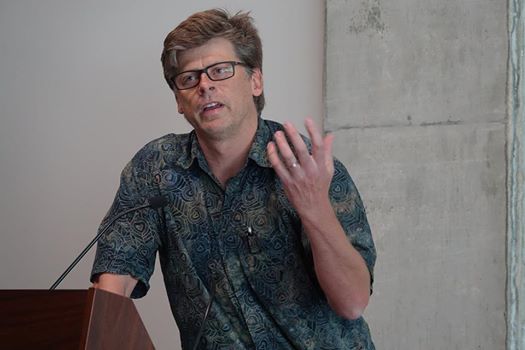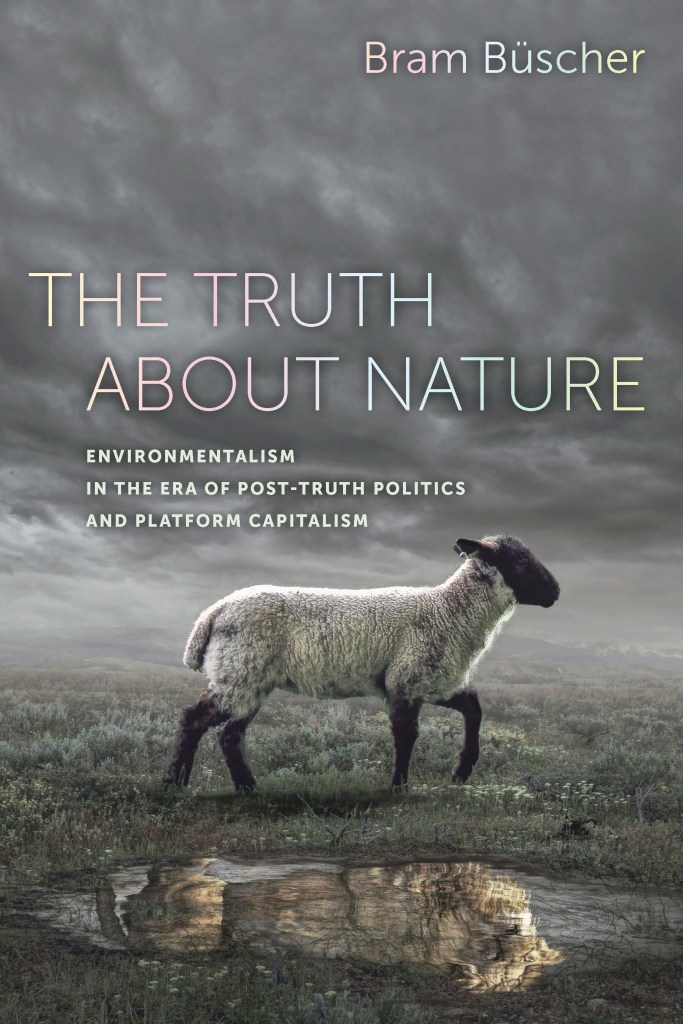
The Truth About Nature
Environmentalism in the Era of Post-Truth Politics and Platform Capitalism
How should we share the truth about the environmental crisis? At a moment when even the most basic facts about ecology and the climate face contestation and contempt, environmental advocates are at an impasse. Many have turned to social media and digital technologies to shift the tide—but what if their strategy is not only flawed, but dangerous?
The Truth about Nature follows environmental actors as they turn to the internet to save nature. It documents how conservation efforts are transformed through the political economy of platforms and the algorithmic feeds that have been instrumental to the rise of post-truth politics. Developing a novel account of post-truth as an expression of power under platform capitalism, Bram Büscher shows how environmental actors attempt to mediate between structural forms of platform power and the contingent histories and contexts of particular environmental issues. Bringing efforts at wildlife protection in Southern Africa into dialogue with a sweeping analysis of truth and power in the twenty-first century, Büscher makes the case for a new environmental politics: one that radically reignites the art of speaking truth to power.

“If the spectacle of platform capitalism is driven by competition for attention and data, how can battles be fought in the name of climate knowledge? That’s the question posed by this fascinating book. Through a series of incisive and illuminating analyses, Büscher expertly charts what is needed to revive and sustain environmental activism in the face of machines designed to mobilize clicks.”
Nick Srnicek, lecturer in Digital Economy at King’s College, London, and author of Platform Capitalism
“In this sweeping analysis, Bram Büscher poses key a question for 21st century environmentalism: in a “post-truth” era, how can environmentalists mobilize new/social media without falling prey to its pitfalls? Illustrated with fascinating case studies from South Africa, the book is replete with incisive insights about the mediation of environmental politics through digital media and platform capitalism. Büscher’s analysis should be of tremendous interest to a diverse range of scholars working in the digital environmental humanities, environmental studies, geography, political ecology, and science and technology studies.”
Karen Bakker, author of Privatizing Water: Governance Failure and the World’s Water Crisis


“This book is a hearteningly usable portrait of how the nature of mediation, in our digital times, can be used to illuminate the mediation of nature, especially in regard to conservation politics in Africa and beyond. The author offers us a compelling way to challenge the insidious transformation of truth to data, which enables the conversion of nature into digital capital.”
Arjun Appadurai, author of The Future as Cultural Fact: Essays on the Global Condition
“An intense and thought-provoking critique of the digitalization of conservation, which increasingly involves the enmeshing of biological life within the digital realms of new social media and appropriated by platform capitalism and the markets it creates, curates and feeds.”
Bill Adams, author of Green Development: Environment and Sustainability in a Developing World


“In a book as bold and ambitious as its title suggests, Bram Büscher grapples with the conundrum of how to formulate an actionable assessment of environmental crises in a post-truth context. To those who dedicate their labor toward “saving nature,” Büscher’s message is, beware the Trojan horse that is new social media. Using examples from his extensive research in southern Africa, Büscher shows the reader how environmental narratives circulated on social media platforms in efforts to “save nature” are not only of limited effectiveness, but also reinforce the structural dynamics responsible for environmental crises. He explains why this is so through a critical examination of the political economy of platform capitalism, represented by Facebook, Google, and their ilk. In the process, he offers a clear-eyed, if disquieting, assessment of how profitability under platform capitalism is not dependent on content truthfulness. Indeed, truthfulness is irrelevant to profits, because clicks and browse histories, not verifiable facts, are the commodity. Büscher ultimately offers an optimistic vision of a post-capitalist platform future. Speaking truth to power, he argues, remains the most effective path toward that future. His book delivers an extremely timely and important intervention in environmental crisis narratives in the age of social media. It should be essential reading for anyone, from theorists to activists, interested in slowing and reversing the destruction of nature.”
Roderick P. Neumann, author of Imposing Wilderness: Struggles of Livelihood and Nature Preservation in Africa.
“A new conservation and development politics is in play in our post-truth world. Bram Büscher’s latest book reveals its forms, its origins, and how it is destroying the natures it set out to save. Büscher has spent years conducting fieldwork among conservationists, poachers, politicians, platform capitalists and South African wildlife. He shows here how “doing good” by going viral looks different when viewed on the ground and online. A serious and accessible philosophical discussion undergirds Büscher’s unpacking of the social media platforms and platform capitalist politics remaking Truths and “truths” about charismatic megafauna and their erstwhile protectors. A #hashtag heaven of fortress conservation reinforced by new media; and a good read.”
Nancy Lee Peluso, Henry J. Vaux Distinguished Professor of Forest Policy, University Of California, Berkeley and author of Rich Forests, Poor People: Resource Control and Resistance in Java.


“Social media is a major vector for environmental consciousness. But as this book lucidly demonstrates, digital calls to observe, celebrate, and save our natural world might do just the opposite—distorting conservation programs while reinforcing hierarchies of race and class. With a rich blend of theoretical analysis and detailed case studies, this book will be essential reading for scholars, activists, and communications professionals concerned with media and environmental conservation.”
Thor Kerr, author of To the Beach: Community Conservation and its Role in Sustainable Development
REVIEWS
“This is an important book for people wanting to understand the interactions between social media and other platforms, truth, and the environment. While the book does not offer easy answers, it will be useful to scholars and practitioners in multiple fields who are working on their diagnosis of the problem.”— Holly Jean Buck, Journal of Development Studies
“The significance of this book goes far beyond the environmental dimension, as the main argument and the detailed analysis to which it gives rise are of the utmost importance for understanding the social and political tensions that animate the world today.”- Anne-Lise Boyer, New Global Studies
“The book strikes an even balance between renewed theoretical insights and situated case studies to show how the consequences of platform capitalism are materializing in the conservation space. This dual effort—to synthesize theoretical debate to stimulate practical reflection—is well struck by Büscher. This synthesis, along with Büscher’s writing style, makes for an approachable yet nuanced piece. The intellectual labor that this piece presents sits well with Büscher’s attempt, here and in other work, to actively reshape nondialectical conceptions of the world” – Joris Gort, AAG Review of Books
“This book is another example of Büscher’s political ecological trailblazing project. Büscher is the innovative and original scholar at the forefront of recent developments, brim-full of new ideas and bold arguments, utterly inspiring, and with an accessible style of conveying complex, bulky issues. I have always regarded Büscher’s contributions as works that seek to break new ground regarding topics and their critical-theoretical conceptualization. (…) The bottom line is: in times when some emphatically embrace the abstract dualism that brought us into crisis (e.g., Malm, 2018), while others take off in the opposite direction, into an equally abstract “pluriverse” (e.g., Escobar, 2018) – Truth reads like a remedy thanks to its political-ecological outlook, with its feet on the empirical ground, its heart in the practical world, and its head in the conceptual sky; it stands contradictions and does what others only write about: dialectics. Truth is a prime example of topical, generative, cutting-edge contemporary political ecology” – Michael Kleinod, Human Ecology

